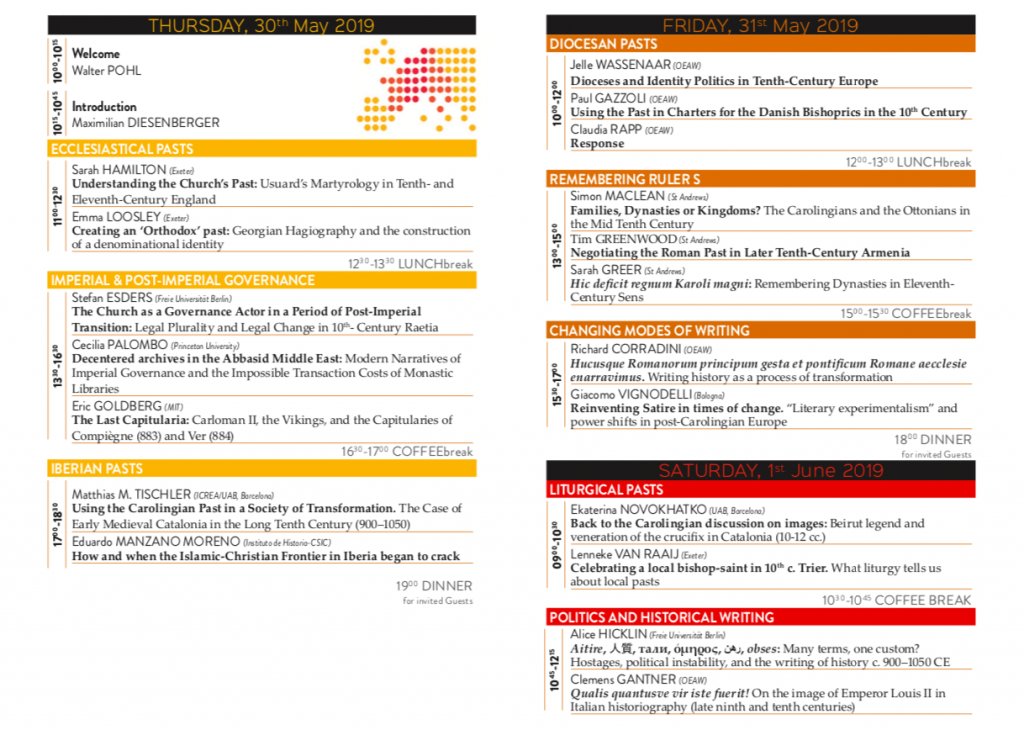USES OF THE PAST IN TIMES OF TRANSITION: FORGETTING, USING AND DISCREDITING THE PAST
30TH OF MAY TO THE 1ST OF JUNE
Österreichische Akademie der Wissenschaften
HOLLANDSTRAßE 11-13, 1ST FLOOR
Our public academic conference will be hosted by our project members in Vienna from Thursday May 30th to Saturday June 1st. Below you can find information about the invited and project speakers and their papers.

Thursday May 30th
10.00-10.15: Welcome by Walter Pohl
10.15-10.45: Introduction by Max Diesenberger
11.00 – 12.30: Ecclesiastical Pasts
Sarah Hamilton, ‘Understanding the church’s past: Usuard’s martyrology in tenth- and eleventh-century England’
Emma Loosely, ‘Creating an ‘Orthodox’ past: Georgian hagiography and the construction of a denominational identity’
13.30-16.30: Imperial and Post-Imperial Governance
Stefan Esders, ‘The Church as a governance actor in a period of post-imperial transition’
Cecilia Palombo, ‘Decentred archives in the Abbasid Middle East: modern narratives of imperial governance and the impossible transaction costs of monastic libraries’
Eric J. Goldberg, ‘The last Capitularia: Carloman II, the Vikings, and the Capitularies of Compiègne (883) and Ver (884)’
17.00-18.30: Iberian Pasts
Matthias M. Tischler, ‘Using the Carolingian past in a society of transformation: the case of early medieval Catalonia in the long tenth century (900-1050)’
Eduardo Manzano Moreno, ‘How and when the Islamic-Christian frontier in Iberia began to crack’
Friday May 31st
10.00-12.00: Diocesan Pasts
Jelle Wassenaar, ‘Dioceses and identity politics in tenth-century Europe’
Paul Gazzoli, ‘Using the past in charters for the Danish bishoprics in the tenth century’
Claudia Rapp, ‘Response’
13.00-15.00: Remembering Rulers
Simon MacLean, ‘Families, dynasties, or kingdoms? The Carolingians and the Ottonians in the mid-tenth century’
Tim Greenwood, ‘Negotiating the Roman past in later tenth-century Armenia’
Sarah Greer, ‘Hic deficit regnum Karoli magni: remembering dynasties in eleventh-century Sens’
15.30-17.00: Changing Modes of Writing
Richard Corradini, ‘Hucusque Romanorum principum gesta et pontificum Romane aecclesie enarravimus. Writing history as a process of transformation’
Giacomo Vignodelli, ‘Reinventing satire in times of change: “literary experimentalism” and power shifts in post-Carolingian Europe’
Saturday June 1st
9.00-10.30: Liturgical Pasts
Ekaterina Novokhatko, ‘Back to the Carolingian discussion on images: Beirut Legend and veneration of the crucifix in Catalonia (10-12 cc)’
Lenneke van Raaij, ‘Celebrating a local Bishop-Saint in 10th C. Trier. What liturgy tells us about local pasts.’
10.45-12.15: Politics and Historical Writing
Alice Hicklin, ‘Aitire, 人質, тали, όμηρος, رھن ,obses: Many terms, one custom? Hostages, political instability, and the writing of history c. 900–1050 CE’
Clemens Gantner, ‘Qualis quantusve vir iste fuerit! On the image of Emperor Louis II in Italian historiography (late ninth and tenth centuries)’

